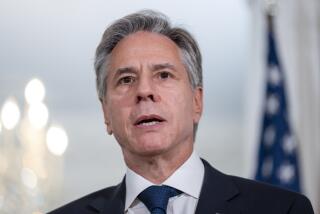Then, After the Gulf Is Settled . . . : Peace: Why not a Helsinki process--a wide-ranging security conference--for the world’s most war-torn region?
- Share via
We recently returned from Moscow, where we took part in three days of meetings of the Soviet-American Task Force in Lebanon and the Middle East. The task force is made up of leading U.S. and Soviet Middle East experts--unofficial but with access to policy-making channels. It operates on the premise that non-governmental “citizen diplomacy” might produce some fresh thinking for the Middle East at a time when the two governments have stated that they want to expand their cooperation in the region but are preoccupied with the crush of current events.
The Soviet and American participants agreed from the start that the Persian Gulf crisis has caused too much disruption for the Middle East ever to settle back into old patterns and alliances. Even if war is averted, turmoil and frustration are likely to increase in the region, aggravating existing conflicts and creating new problems. There was a shared sense that it was time to explore new approaches, starting with a comprehensive strategy that takes into account the interconnection of the Middle East’s many volatile issues.
Both the Soviet and American members of the task force noted that their countries are working together to settle conflicts and crises in Europe, Southern Africa, even Cambodia. Why, they asked, could not the superpowers make comparable efforts in the Middle East?
To this end, the task force came up with its central recommendation: that the U.S. and Soviet governments jointly convene, under U.N. auspices, a Conference on Peace and Cooperation in the Middle East. The aim would be to launch a process similar to that of the 1975 Helsinki Conference on Security and Cooperation in Europe (CSCE), which provided a context for reducing East-West tensions.
It was agreed that the Mideast conference should include, along with the great powers, all countries of the region, and that Palestinians should attend, having chosen their own representatives. The task force urged all parties to be as flexible as possible in finding a formula that would make possible Palestinian and Israeli attendance.
The task force spent much time considering Israeli sensitivities and actively sought ways to make the process as attractive as possible to Israel. The hope was that a comprehensive approach would appeal to Israelis, in that they would have the opportunity to talk with Arabs from all over the region on a wide range of regional problems--not only on the question of borders.
In addition, task force members believed that Israel and other nations would recognize the positive impact of introducing into the region such concepts from Europe as mutual and balanced force reductions and confidence-building measures.
The international conference would not in any way try to impose solutions. Rather it would be a forum for the parties to meet and talk and negotiate agreements. The conference would provide a framework for parallel negotiations on a wide variety of issues--or “baskets,” to use the CSCE language. These might include:
--arms control, on both conventional weapons and weapons of mass destruction;
--Arab-Israeli peace, including agreements on borders, security, mutual recognition, legitimate political rights of the Palestinian people and refugee claims;
--the Lebanese crisis, with the aim of securing national sovereignty and territorial integrity;
--security and stability in the Persian Gulf;
--regional economic development and cooperation;
--human rights and democratic freedoms.
Both the Soviet and the American members of the task force agreed to raise these issues with their governments. Initial Soviet reaction has been quite favorable--not surprising in view of the longstanding Soviet position in favor of an international peace conference for the Middle East.
In Washington, officials have been interested but noncommittal. One key U.S. official said that it would be impossible to focus policy-makers’ attention on such a proposal until the gulf crisis is settled, and then new initiatives would be needed.
Obviously, a conference on peace and security in the Middle East is an ambitious undertaking. None of us in Moscow had any illusions that it would occur overnight or that it would produce instant results. After all, the Helsinki process took 15 years. We strongly believe, however, that such a process is necessary, and it must start sometime.
More to Read
Sign up for Essential California
The most important California stories and recommendations in your inbox every morning.
You may occasionally receive promotional content from the Los Angeles Times.













